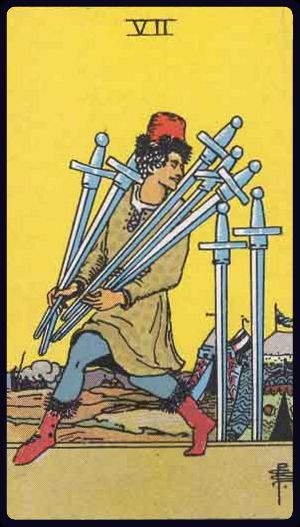Seven of Swords
In the traditional deck...


The Seven of Swords represents deception, betrayal, and the act of taking what doesn't belong to you through cunning or stealth rather than honest means. This card symbolizes situations involving theft, lies, treachery, or the deliberate concealment of important information from those who have a right to know it. The Seven of Swords often appears when someone is being dishonest about their intentions, when trust is being violated, or when cowardly behavior masquerades as cleverness. This card warns of the tendency to choose the easy path of deception over the difficult path of truth, and reminds us that while lies and betrayal might offer short-term advantages, they ultimately undermine relationships, reputation, and self-respect. The Seven of Swords challenges us to examine our own integrity and to be alert to situations where others might be taking advantage of our trust or goodwill.
In the Shakespeare deck...


Parolles kneeling blindfolded before his captors, surrounded by white feathers that mock his cowardice, perfectly captures the Seven of Swords' themes of betrayal, self-serving deception, and the exposure of false character. His immediate willingness to betray military secrets reveals how quickly he abandons loyalty when faced with personal danger, embodying the Seven of Swords' warning about those who appear trustworthy but lack true integrity. The blindfold represents both his literal situation and the moral blindness that allows him to rationalize treachery as survival, while the white feathers—traditional symbols of cowardice—show how his deception ultimately exposes his true nature rather than protecting it. Parolles's betrayal demonstrates the Seven of Swords' central truth: that those who choose deception and betrayal over courage and honesty reveal themselves to be fundamentally unreliable, and their attempts to save themselves through treachery often lead to greater shame and loss than facing truth with integrity would have brought.
Interpretation...
When the Seven of Swords appears, you may be dealing with situations involving deception, betrayal, or dishonest behavior—either your own or someone else's. This card suggests that someone in your situation is not being truthful about their intentions, capabilities, or loyalties, and this deception will likely be exposed in ways that cause greater damage than honesty would have. The Seven of Swords warns against the temptation to take shortcuts through lies, theft, or betrayal, reminding you that such tactics typically backfire and destroy the very things they were meant to protect. Like Parolles's rapid capitulation under pressure, this card may indicate that someone's true character is about to be revealed, showing them to be far less trustworthy or courageous than they appeared.
Advice...
Be alert to signs that someone may be deceiving you or withholding important information
Examine your own behavior for areas where you might be choosing convenient lies over difficult truths
Recognize that betrayal and deception typically cause more problems than they solve
Understand that true character is revealed under pressure—yours and others'
Don't trust those who show they're willing to betray others for their own advantage
Choose courage and honesty over self-serving deception, even when truth feels risky
Remember that integrity, once lost through betrayal, is extremely difficult to rebuild